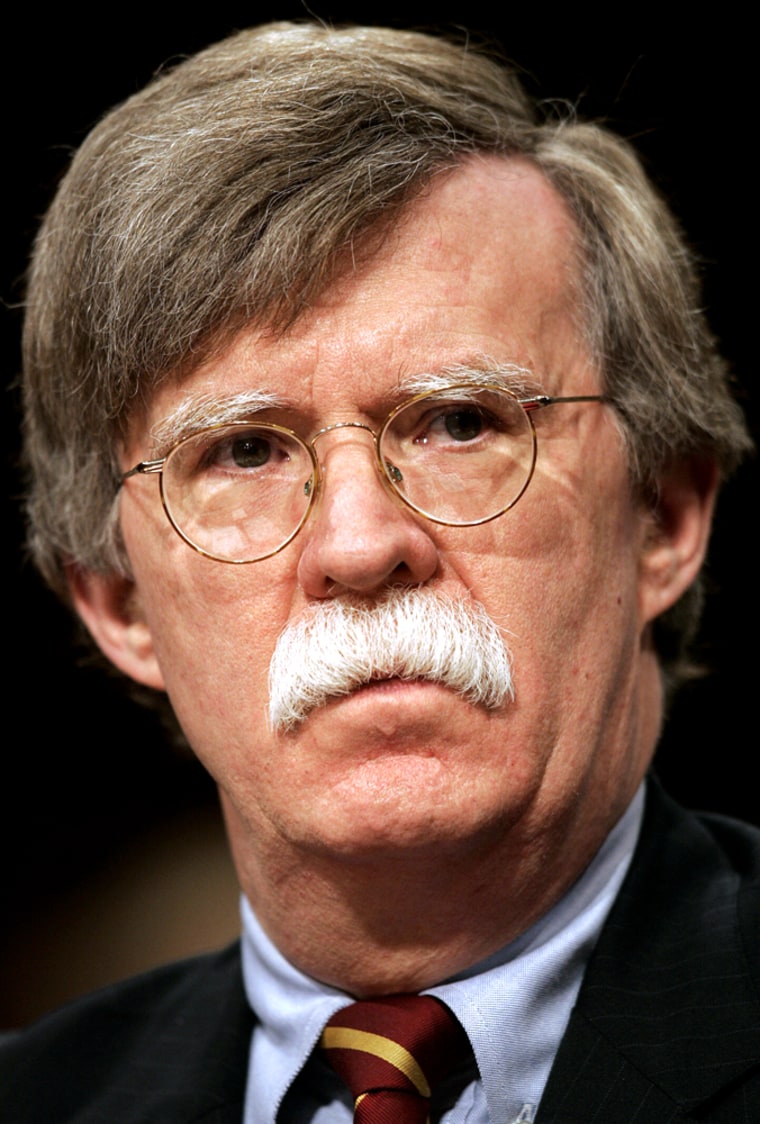Now that the Senate has, for the second time in four weeks, voted to block an up-or-down vote on President Bush's nomination of John Bolton to be ambassador to the United Nations, the president could use his power under Article Two, Section 2 of the Constitution to give Bolton a recess appointment to the job.
In a vote Monday night, 37 Senate Democrats and one Republican, Sen. George Voinovich of Ohio, voted to prevent Bolton from having an up-or-down confirmation vote. Bolton thus failed to get the 60 votes he needed for his nomination to move to a confirmation vote.
Given the backdrop of Bush’s inability to persuade Congress to consider Social Security legislation permitting workers to invest some of their tax payments in private retirement accounts and the failure of Republicans to win an earlier cloture vote on Bolton’s nomination, on May 23, Monday night’s vote was another test of whether Bush’s influence in Congress is dwindling.
Bush had repeatedly urged the Senate to approve Bolton’s nomination, speaking as late as Monday afternoon at a White House press briefing.
After the vote, one key GOP senator, Sen. Pat Roberts of Kansas, chairman of the Intelligence Committee, suggested that "maybe our country would be better served to have an up-or-down vote and go ahead and approve him, rather than force a recess appointment which would weaken not only ... Mr. Bolton but also the United States. I would hope they (Bolton's foes) would rise above that.”
“If the administration goes ahead with a recess appointment I think that’s a mistake and I urge them not to do that,” said Bolton's chief adversary, Sen. Chris Dodd, D- Conn.
‘No joy’ in defeating Bush
“Contrary to what my colleagues may feel, I take no joy in any of this,” Dodd told reporters.
But for Democrats, there was reason to rejoice in having derailed Bush's nominee. In contrast with the Democrats’ marked lack of success so far this year in defeating Bush’s judicial nominees, the Bolton fight has given the Democrats an undeniable victory over the president.
One thing Dodd and other Democrats did skillfully was to shift the focus of the Bolton debate from reform of the United Nations to allegations that Bolton intimidated people who worked for him at the State Department.
It remains to be seen if Democrats’ success so far in scuttling Bolton’s nomination will lead them to revert to filibusters of Bush judicial nominations in the weeks ahead.
Bush has had a rough time in recent weeks in his dealings with Congress.
In two rebuffs for the president last week, the House passed a measure scaling back the USA Patriot Act by barring the FBI from getting library circulation records, library patron lists or book sales records in investigations of terrorism; it also approved a measure which the administration opposed to cut United States funding for the U.N. by 50 percent unless it implements reforms.
Bush did not answer a reporter's question Monday about whether he would use his recess appointment power to make Bolton the U.N. envoy despite the Senate's refusal to act on the nomination.
The recess appointment power allows a president to sidestep the Senate when it decides to not vote on a nomination, as in Bolton’s case, or when it simply never gets around to considering a nomination.
Under the Constitution, the recess appointment is temporary, lasting only until the end of the session of Congress, in Bolton’s case, until December 2007.
More than 3,000 appointed
Since George Washington, presidents have made more than 3,000 recess appointments to executive branch or judicial positions.
The justification for this power is that the very nature of the executive branch entails the ability to act. Arguably for some jobs the president can’t wait until members of Congress return to town from a recess or adjournment.
Ordinarily a president will use the power after Congress has adjourned for the year, usually in December.
But presidents have made 285 recess appointments during intra-session recesses, that is, during short breaks when Congress leaves the Capitol for a week or two.
Legal scholars disagree about how long a recess must be in order to fit the intention of those who wrote the Constitution. Bill Clinton and other presidents have made recess appointments during nine- or 10-day breaks.
Republican assails Clinton
Recess appointments often cause friction between the president and Congress.
In the waning days of his presidency in late December 2000, when Clinton used the recess appointment power to put Roger Gregory on the Court of Appeals for the Fourth Circuit, Sen. James Inhofe, R-Okla., said it was ''outrageously inappropriate for any president to fill a federal judgeship through a recess appointment in a deliberate effort to bypass the Senate.”
The Senate had refused to act on Gregory's nomination prior to Clinton's recess appointment of him.
Bush has used recess appointments to place two judicial nominees, Charles Pickering and William Pryor, on the bench. Senate Democrats had stymied both men by filibuster threats.
Last October the Court of Appeals for the 11th Circuit upheld Bush’s recess appointment of Pryor as a judge to that court. (Pryor recused himself from the decision.)
“For those who fear judicial recess appointments because the appointments bypass the Senate completely, we stress the obvious: The temporary judges lose their offices at the end of the Senate’s next session,” declared the eight-judge majority. Two judges dissented.
“I do not believe that the Constitution permits a president to frustrate in this way the careful separation of powers intended by the framers,” said dissenting Judge Rosemary Barkett.
After his re-election last November, Bush re-nominated Pryor, and the Senate, by a vote of 53 to 45, confirmed his nomination on June 9.
